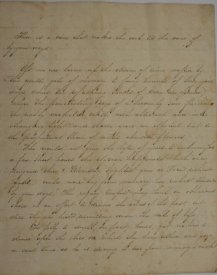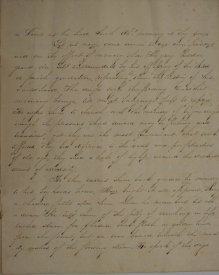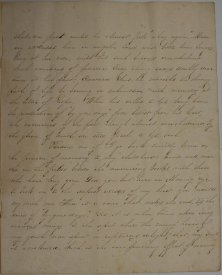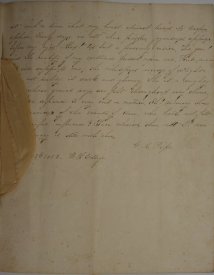Transcription:
"There is a voice that makes the soul, 'tis the voice of by-gone days"
Georgia A. Pope
Presented by her daughter, Mary Will (Jones) Franklin.
1853
Oft we are borne up the streams of time, wafted by the gentle gale of memory to fairy haunts of long gone days, where the refreshing shades of Eden are spread; where the penetrating rays of a heavenly sun flecking the richly carpeted earth with alternate and inter-changing light and shade gives an etherial (sic) tint to the perpetual bloom of earths (sic) chaisest (sic) flowers.
Who would not give the hope of years to embrace for a few short hours the Elysian happiness which once reigned there? Golconda's (sic) brightest gem or Peru's richest gold could never buy from memory her richest treasure "by-gone days." The raging tempest may howl on oblivion's shore in an effort to drown the voices of the past, but still they are heard resounding down the vale of life.
Tis folly to dwell on past hours, yet we love to stand upon the shore o'er which they have rolled, and gaze on cruel time as he is striving to tear from memory's casket [page 1] its brightest gems, and hastening us on to an unwelcome future where amid the darkest scenes of adversity our souls may never be awakened by the voice of "by-gone days"
Need we bid the dead arise to tell us of the pleasure of memory? Lend a listening ear to Eden's history, (sic) Go back with memory to the period when sin had not corrupted it. See there the beings created by God in his own image, dwelling in perfect happiness; there (sic) earthly abode illuminated with the smiles of their Creator. But Satan has accomplished his atrocious end. Mark them now! as (sic) they are wandering forth under the curse of an offended God. Hear their parting words as the gate of Paradise is closed forever against them.
Must I leave the Paradise? Thus leave the native soil? (sic) these happy walks and shades
Fit haunt of Gods?*
They were borne (sic) on memory's soft wings to the past pleasures enjoyed upon their native soil, and amid its happy walks; they cast a wishful eye upon its golden fruit, but could not taste; they gazed upon its crystal streams, but turned away still thirsty. [page 2] The recollection of early days sends a holy feeling of joy mingled with grief at departure through their souls; the low plaintive tone of the fount still sounds in their ears. On they pass nurturing well the memory of "by-gone days" as a healing balm for their sin stricken souls.
The power of memory is strikingly exhibited in instances of more modern times. Look back to the times when mighty Rome was but a small collection of rude huts. What are our emotions when we review its earliest history? We see that peace, tranquility and domestic happiness once reigned where now cruel ambitions, revenge, malice and envious spirits rule with tyrannical sway. Had we the original villager to gaze with us upon that little world, where his rude hut once stood; where his happy childhood was spent, and could we hear him tell of his happiness when in sweet solitude he listened to the voice of memory as she repeated fondly again and again the history of his early home; - (sic) ambitious slave- (sic) envy's captive could but say give us such [page 3] a Rome as he had. Such Oh! memory (sic) is thy power.
Let us now come down to our own firesides and see the effect of memory there. The gray headed grand sire sits surrounded by his offspring of the third or fourth generation, repeating to them the history of his childhood. The deep sigh the flowing tears that memory brings, tell what language fails to express. He urges them to cherish well the memory of "by-gone days;" though the pleasure thus derived may be fleeting and transient, yet they are the most permanent that earth affords. They bid defiance to the cares and perplexities of old age, they shed a halo of light around the darkest scenes of adversity.
He then carries them back guided by memory to his boy-hood home. How bright it all appears, though a shadow falls upon him when he remembers "tis (sic) all a dream" (sic) He tells them of the folly of searching in lifs (sic) turbid stream for pleasure that flash in golden hues from the fount; but are soon buried beneath the muddy waters of the flowing stream. He speak (sic) of the days [page 4] that are past until he almost feels "a boy again." Memory addresses him in angelic tones and bids him linger long at her side; until his soul becomes overwhelmed with emotions of pleasure (sic *no punctuation to indicate end of sentence) Every thing seems doubly dear since it has past (gone). Onward thus he smooths (sic) the thorny path of life by bowing in submission with memory at the alter (sic) of hope. When his (sic) called to his (sic) long home the recollection of "by-gone days" fade latest from his heart; the memories of the past though almost overshadowed by the gloom of death are still fresh in his soul.
Pardon me if I go back sweetly borne on the pinion of memory to my childhood home and wander in the fields beside the murmuring brooks with those who have long gone. Did you but have an all seeing eye to look in to the deepest recesses of my heart, you would say with me There is a voice that makes the soul, 'tis the voice of "by-gone days." Yes it is when borne upon imaginations (sic) wings to the spot where the sunny hours of my youth were spent in rapturous delight; that my soul is awakened. Such is the over possessing effect of memory [page 5] at such a time, that my heart almost leaves its proper sphere. Early days in all their joyousness appear before my eyes. Alas! 'tis but a passing vision, Tis gone! and (sic) the reality of my existence presses upon me. But memory still supports me; she whispers words of delight when all reality is dark and gloomy. She is a mighty sun whose genial rays are felt throughout every clime. She bids defiance to every evil in nature. Oh! memory (sic) thou stern recorder of the events of time, who hath not felt they powerful influence? Turn where'ver (sic) thou wilt O! man and memory is still with thee.
G.A. Pope
July 13th, 1853. W.F. College
[page 6]
Notes:
*"Must I thus leave thee, Paradise? Thus leave Thee, native soil, these happy walks and shades Fit haunt of Gods?" John Milton, Paradise Lost
Georgia A. Pope
Presented by her daughter, Mary Will (Jones) Franklin.
1853
Oft we are borne up the streams of time, wafted by the gentle gale of memory to fairy haunts of long gone days, where the refreshing shades of Eden are spread; where the penetrating rays of a heavenly sun flecking the richly carpeted earth with alternate and inter-changing light and shade gives an etherial (sic) tint to the perpetual bloom of earths (sic) chaisest (sic) flowers.
Who would not give the hope of years to embrace for a few short hours the Elysian happiness which once reigned there? Golconda's (sic) brightest gem or Peru's richest gold could never buy from memory her richest treasure "by-gone days." The raging tempest may howl on oblivion's shore in an effort to drown the voices of the past, but still they are heard resounding down the vale of life.
Tis folly to dwell on past hours, yet we love to stand upon the shore o'er which they have rolled, and gaze on cruel time as he is striving to tear from memory's casket [page 1] its brightest gems, and hastening us on to an unwelcome future where amid the darkest scenes of adversity our souls may never be awakened by the voice of "by-gone days"
Need we bid the dead arise to tell us of the pleasure of memory? Lend a listening ear to Eden's history, (sic) Go back with memory to the period when sin had not corrupted it. See there the beings created by God in his own image, dwelling in perfect happiness; there (sic) earthly abode illuminated with the smiles of their Creator. But Satan has accomplished his atrocious end. Mark them now! as (sic) they are wandering forth under the curse of an offended God. Hear their parting words as the gate of Paradise is closed forever against them.
Must I leave the Paradise? Thus leave the native soil? (sic) these happy walks and shades
Fit haunt of Gods?*
They were borne (sic) on memory's soft wings to the past pleasures enjoyed upon their native soil, and amid its happy walks; they cast a wishful eye upon its golden fruit, but could not taste; they gazed upon its crystal streams, but turned away still thirsty. [page 2] The recollection of early days sends a holy feeling of joy mingled with grief at departure through their souls; the low plaintive tone of the fount still sounds in their ears. On they pass nurturing well the memory of "by-gone days" as a healing balm for their sin stricken souls.
The power of memory is strikingly exhibited in instances of more modern times. Look back to the times when mighty Rome was but a small collection of rude huts. What are our emotions when we review its earliest history? We see that peace, tranquility and domestic happiness once reigned where now cruel ambitions, revenge, malice and envious spirits rule with tyrannical sway. Had we the original villager to gaze with us upon that little world, where his rude hut once stood; where his happy childhood was spent, and could we hear him tell of his happiness when in sweet solitude he listened to the voice of memory as she repeated fondly again and again the history of his early home; - (sic) ambitious slave- (sic) envy's captive could but say give us such [page 3] a Rome as he had. Such Oh! memory (sic) is thy power.
Let us now come down to our own firesides and see the effect of memory there. The gray headed grand sire sits surrounded by his offspring of the third or fourth generation, repeating to them the history of his childhood. The deep sigh the flowing tears that memory brings, tell what language fails to express. He urges them to cherish well the memory of "by-gone days;" though the pleasure thus derived may be fleeting and transient, yet they are the most permanent that earth affords. They bid defiance to the cares and perplexities of old age, they shed a halo of light around the darkest scenes of adversity.
He then carries them back guided by memory to his boy-hood home. How bright it all appears, though a shadow falls upon him when he remembers "tis (sic) all a dream" (sic) He tells them of the folly of searching in lifs (sic) turbid stream for pleasure that flash in golden hues from the fount; but are soon buried beneath the muddy waters of the flowing stream. He speak (sic) of the days [page 4] that are past until he almost feels "a boy again." Memory addresses him in angelic tones and bids him linger long at her side; until his soul becomes overwhelmed with emotions of pleasure (sic *no punctuation to indicate end of sentence) Every thing seems doubly dear since it has past (gone). Onward thus he smooths (sic) the thorny path of life by bowing in submission with memory at the alter (sic) of hope. When his (sic) called to his (sic) long home the recollection of "by-gone days" fade latest from his heart; the memories of the past though almost overshadowed by the gloom of death are still fresh in his soul.
Pardon me if I go back sweetly borne on the pinion of memory to my childhood home and wander in the fields beside the murmuring brooks with those who have long gone. Did you but have an all seeing eye to look in to the deepest recesses of my heart, you would say with me There is a voice that makes the soul, 'tis the voice of "by-gone days." Yes it is when borne upon imaginations (sic) wings to the spot where the sunny hours of my youth were spent in rapturous delight; that my soul is awakened. Such is the over possessing effect of memory [page 5] at such a time, that my heart almost leaves its proper sphere. Early days in all their joyousness appear before my eyes. Alas! 'tis but a passing vision, Tis gone! and (sic) the reality of my existence presses upon me. But memory still supports me; she whispers words of delight when all reality is dark and gloomy. She is a mighty sun whose genial rays are felt throughout every clime. She bids defiance to every evil in nature. Oh! memory (sic) thou stern recorder of the events of time, who hath not felt they powerful influence? Turn where'ver (sic) thou wilt O! man and memory is still with thee.
G.A. Pope
July 13th, 1853. W.F. College
[page 6]
Notes:
*"Must I thus leave thee, Paradise? Thus leave Thee, native soil, these happy walks and shades Fit haunt of Gods?" John Milton, Paradise Lost
Category:
8: Communication Artifact
Date:
1853
Dates of Creation:
1853
Object ID:
COMP6




